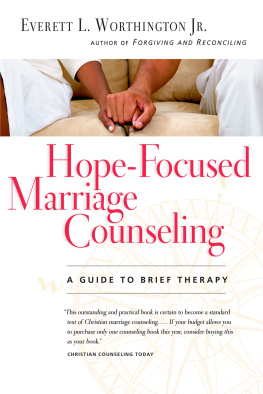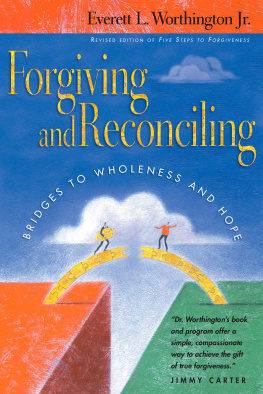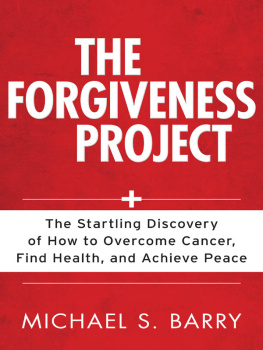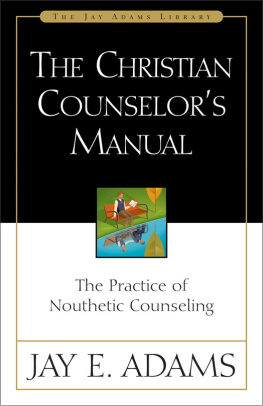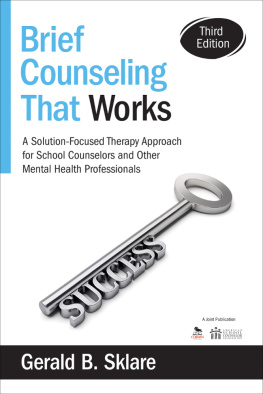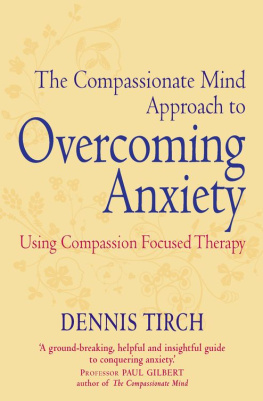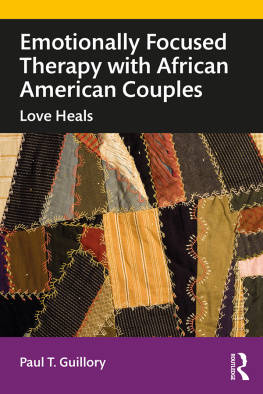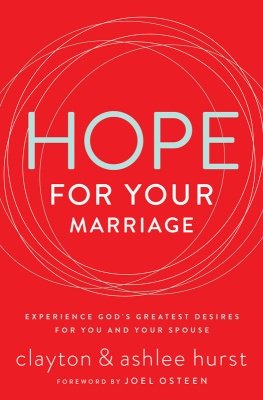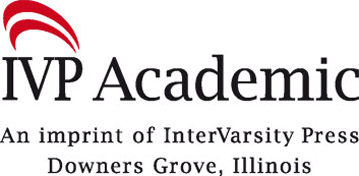EVERETT L. WORTHINGTON JR.
Hope-Focused
Marriage
Counseling
A GUIDE TO BRIEF THERAPY
Expanded Paperback Edition
InterVarsity Press
P.O. Box 1400, Downers Grove, IL 60515-1426
World Wide Web: www.ivpress.com
E-mail:
1999 by Everett L. Worthington Jr.
Introduction 2005 by Everett L. Worthington Jr.
All rights reserved. No part of this book may be reproduced in any form without written permission from InterVarsity Press. InterVarsity Press is the book-publishing division of InterVarsity Christian Fellowship/USA, a student movement active on campus at hundreds of universities, colleges and schools of nursing in the United States of America, and a member movement of the International Fellowship of Evangelical Students. For information about local and regional activities, write Public Relations Dept., InterVarsity Christian Fellowship/USA, 6400 Schroeder Rd., P.O. Box 7895, Madison, WI 53707-7895, or visit the IVCF website at .
Scripture quotations, unless otherwise noted, are from the New Revised Standard Version of the Bible, copyright 1989 by the Division of Christian Education of the National Council of the Churches of Christ in the USA. Used by permission. All rights reserved.
Table 10.1 taken from The Five Love Languages by Gary Chapman. Copyright 1995, Moody Bible Institute of ChicagoMoody Press. Used with permission.
Table 11.3 adapted from Andrew Christensen, N. S. Jacobson and J. C. Babcock, Integrative Behavioral Couple Therapy, in Clinical Handbook of Couple Therapy, ed. N. S. Jacobson and A. S. Gurman, 1995. Used by permission of Guilford Press.
Design: Cindy Kiple
Images: couple holding hands: Image Source/Getty Images
compass: Jennifer Thermes/Getty Images
ISBN 978-0-8308-7198-8 (digital)
ISBN 978-0-8308-2764-0 (print)
This digital document has been produced by Nord Compo.
To Doug McMurry
faithful to Gods call,
worker in his service,
lover of his people
pastor
Acknowledgments
I am grateful to many people in bringing this book to print. Most dramatically I owe a debt to clients who have stubbornly refused to get better when I persisted in working my program and not listening to their program. Clients force us to listen.
Over the years I have been blessed with extremely talented graduate students who have contributed ideas to the theory and practice we have shaped together through our interactions and joint publications. Many of these are now functioning as postdoctoral faculty members or practitioners, and many I have acknowledged in other books. Most recently I have worked closely with the following, who have moved to the postdoctoral level. Jennifer Ripley, Steve Sandage, Taro Kurusu, Kristin Perrone, Wanda Collins and Jeanne Face have contributed to my current theorizing. Jack Berry came to Virginia Commonwealth University (VCU) as a postdoctoral research fellow to work with me on studies related to hope-focused marriage enrichment and FREE (Forgiveness and Reconciliation through Experiencing Empathy). Jack has been a competent theoretician and methodologist, a stimulus to my thinking and a friend.
Doctoral students en route to their Ph.D. have also contributed to my research and theoretical understanding. These include Terry Hight, Dawn Jones, Michelle Schmitt, Dee Drinkard and Nat Wade. In addition, eight other advanced VCU graduate students as well as counselors from Mike Flynns Resource Guidance Services, Kent Radwanis Commonwealth Catholic Charities and Mark Yarhouses coordinating efforts at Regent University have participated in our study of marital enrichment and have been generous with feedback on the approach within an enrichment setting. To a person, the graduate students and counselors with whom I have worked have functioned as collegial collaborators. We truly have worked together, learning from each other. I am pleased to count these collaborators as friends. Many former graduate students have remained close friends, some of them many years after they left VCU to further their professional careers.
Professional colleagues have also provided opportunities that have moved my research and thinking. In 1992 David Benner challenged me to write a version of my approach to help pastors counsel their parishioners. I was blessed to coauthor that book with my own pastor, Doug McMurry. That collaboration was extremely fruitful. Gary Collins and Tim Clinton, president and executive vice president (respectively) of the American Association of Christian Counselors, invited me to speak at many AACC regional conferences. Those conferences, workshops and other invitations to speak that followed from those workshops helped me clarify the model as I put ideas into words and reviewed the feedback from those who heard the talks.
Danny Ng in Singapore, Pam Guneratnam in Malaysia and Mervin van der Spuy in South Africa invited me to speak to professional counselors, lay counselors, university faculty and students, and media in their respective countries, which has challenged me to think more internationally and crossculturally. For example, in Malaysia, after I had spoken to a gathering of psychiatrists who were largely Muslim, a psychiatric resident in traditional Muslim garb rose to his feet when given the opportunity to ask questions. This guy was huge. When he jumped to his feet, I envisioned him leaping across the table, grabbing me by the throat and choking the truth out of me. His question: I have a problem with my intrusive mother-in-law. Can you help me? Many people share human concerns throughout the nations.
In South Africa I spoke at Durban-Westville University to practical theology pastoral graduate students. In spite of a bomb threat that caused the evacuation of campus just as I arrived (no connection, I hope), eleven graduate students and faculty met for my seminar. They challenged me to think about how my ideas applied to rural, poor, black Africans, whose marriages were under enormous strain. I have been forced to confront some of the cultural limits of face-to-face conjoint couples counseling, while being able to affirm the timeless biblical principles of promoting love, faith, work and hope in couples.
Other colleagues continue contributing to ways of helping marriages. David Larson and Michael McCullough, colleagues and friends, both at the National Institute for Healthcare Research, where I serve as a research fellow, have supported me and created numerous opportunities to investigate marriage and forgiveness within a Christian context. Les Parrott and Gary Oliver have been encouraging collaborators. Carl Rilee has been a faithful friend, supporter and colleague, as have Dale Berry and Don Danser.
I continue to be grateful to VCU and its Department of Psychology, led by Steve Robbins, who have supported my research and writing throughout my twenty-plus years there. My colleagues on the faculty, especially Steve Danish, have challenged and supported me throughout the weeks and years.
I am particularly grateful to Sir John Templeton, Jack Templeton, Charles Harper and others at the John Templeton Foundation for having confidence to fund some of my research on forgiveness and reconciliation and on hope-focused marital enrichment with early married couples. Their encouragement, intellectual stimulation and financial beneficence have been a blessing. The financial support for my research by the General Clinical Research Center at Virginia Commonwealth University (grant NIH5 M01 RR00065) has also been greatly appreciated.

